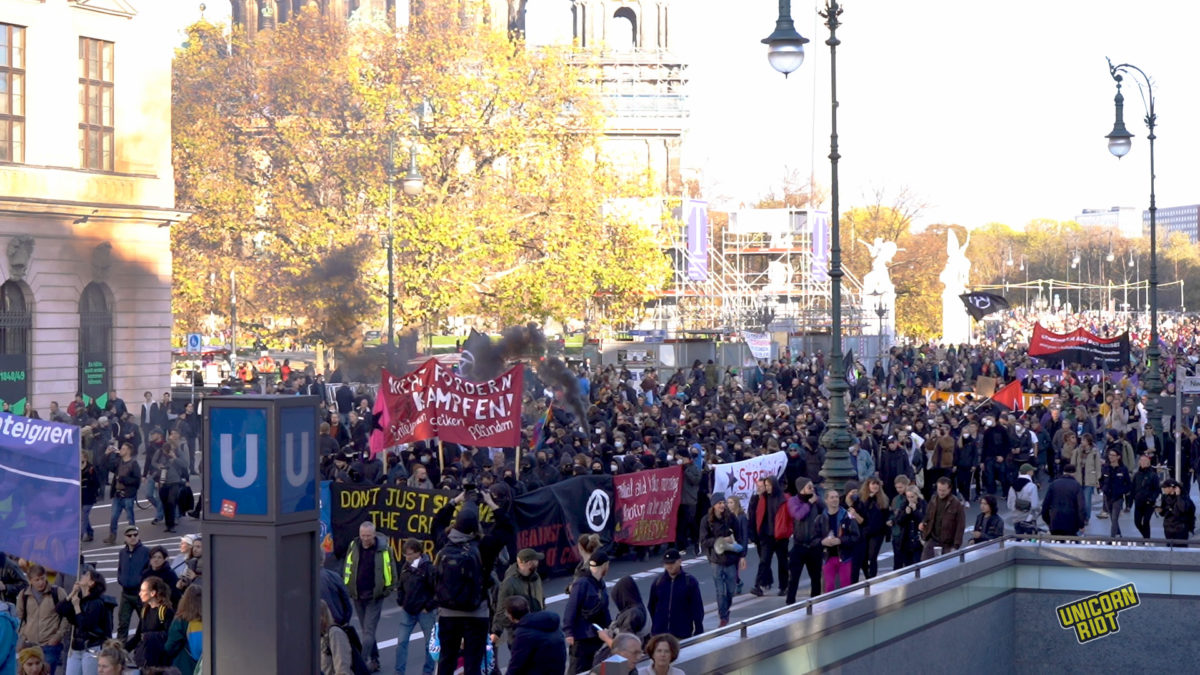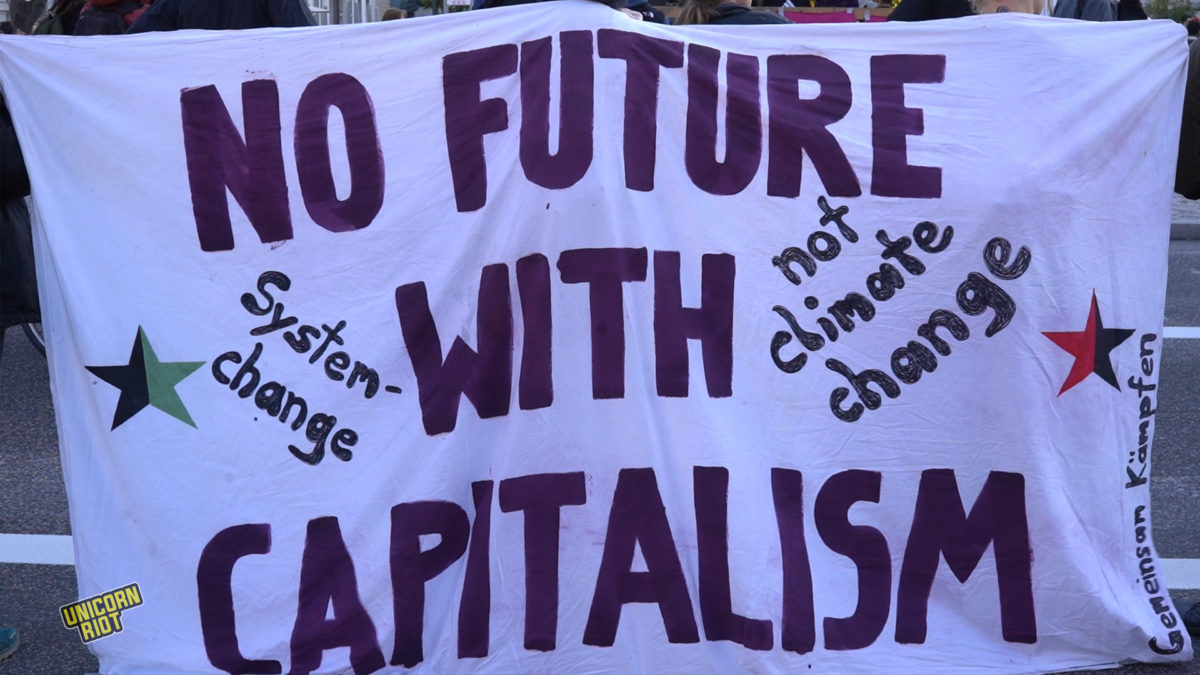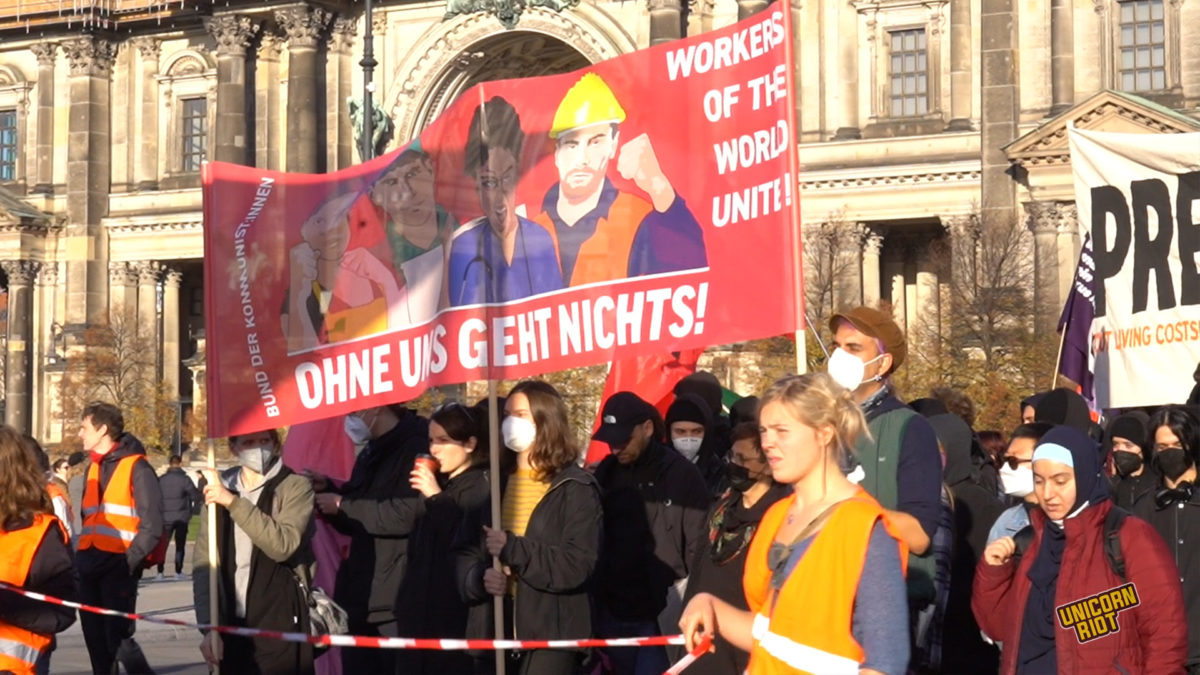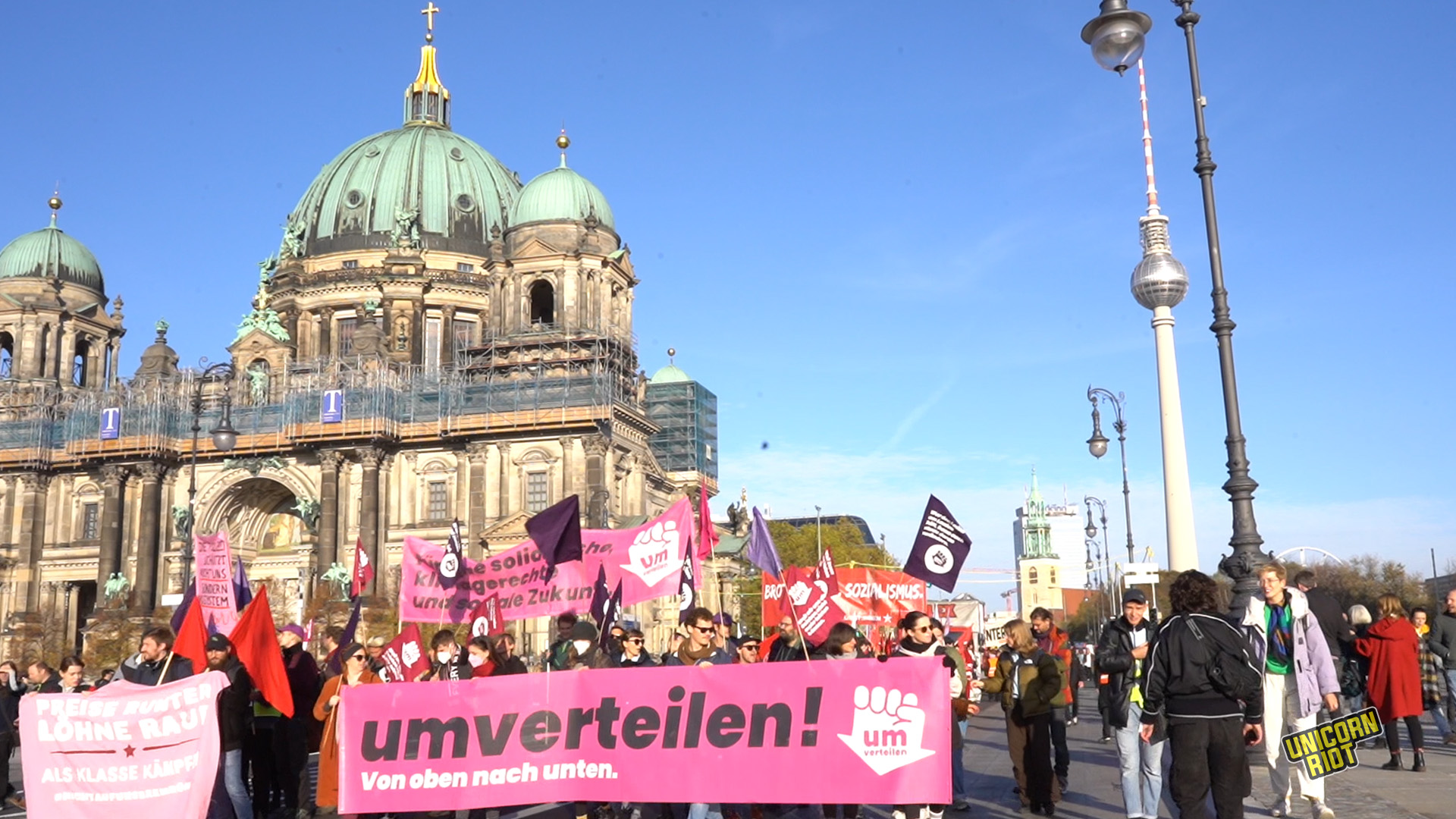‘Redistribute Now!’ Protest Against Inflation Effects in Germany
Inflation, skyrocketing energy prices for consumers, energy companies posting record profits due to the crisis, rising rents: thousands of demonstrators who had protested in Berlin on an unusual warm Saturday in November had all these points in mind.
Several thousand participants were expected by the organizers “if it goes well,” as one of the initiators was quoted in the German press. As it turned out, the estimate was on point: While there were initially significantly fewer, the march on Nov. 12, 2022, grew to over 7,000 people. The march was the largest yet in a so-far uneventful politically-declared “hot autumn.”
Organizations like ‘Who Has, Gives,’ ‘Fridays for Future Berlin,’ ‘Care Revolution’ and ‘Attac’ all called for the “Redistribute!” (“Umverteilen“) demonstration. A wide progressive spectrum of left-wing, environmental and neighborhood groups participated in the alliance which was founded in the end of summer 2022.
The organizers advocate a price cap for electricity, heating costs and rents, as well as higher wages.
Organizers stated that the unifying moment at the demonstration, which was also the main success of the action, was the rediscovery of the connection between almost all emancipatory struggles. These struggles are often carried out in isolation, and organizers remembered that there is a common necessity of changed economic conditions.
Surveys Show Europeans Are Worried Over Rising Inflation, Cost of Living
According to a survey [PDF] by French non-profit Secours populaire, Europeans have been forced to “tighten their belts” in order to cover their food and heating costs as winter approaches and are reducing the money they used to spend on their children’s needs. The survey of 6,000 people took place in Germany, France, Greece, Italy, Poland and the UK. The central finding is that rising prices of energy and consumer goods, which occurred at the end of the COVID crisis and were reinforced by the outbreak of war in Ukraine, have weakened European households.
Europeans questioned in the survey said it is “the increase in prices” that “explains most the decrease in their purchasing power, far ahead of taxes and the decrease in income linked to their activity.” Indeed, 89% of respondents think so. In particular, 92% of respondents in Germany and 91% in the United Kingdom, two countries where energy bills have increased considerably, believe this to be the case.
The survey shows that the situation for European households has worsened in 2022, with 53% of respondents reporting that they have had to make complicated choices due to the difficult economic situation in the last six months. Thus:
- 36% had to limit their travel (by car or public transport)
- 22% had to limit heating in their home and therefore get cold
- 14% had to ask relatives to lend or give them money
- 14% had to postpone the treatment of a health problem
- 13% need to do more than one job to survive or accept a job that does not satisfy them
- 11% skip a meal despite being hungry
- 6% had to ask friends, family for accommodation or a club for food and clothing
Other sources confirm the data for Germany. Due to high inflation, 63% of consumers in Germany are spending less money, according to a survey commissioned by the Federation of German Consumer Organizations. According to the survey, a further 20% expect to have to restrict their spending in the future.
In the end of October, the President of Germany Frank Walter Steinmeier delivered a dramatic speech in the midst of the war in Ukraine and the energy crisis, preparing his “compatriots” for “difficult, hard years ahead.” “We must not face the new era in fear as defenseless (…) We need a spirit of resistance, we need resilience,” he said. Similar perseverance slogans have been expressed across the ruling political establishment in Germany – from the economy minister Robert Habeck (Green Party), to the finance minister Christian Lindner (Liberal Free Democratic Party), to Chancellor Olaf Scholz (Center-left Social Democratic Party).

“Hot Autumn” in Europe?
Corporate media and politicians spoke all summer about an upcoming “hot autumn” because of rising prices. Energy and food prices comprise less than a third of the basket of goods and services used to measure inflation (the consumer price index – CPI). But according to The Economist the trends in the rest of the basket are also worrying.
Prices for services and goods other than food and energy increased by six percent over the last three months. Although energy prices may lie behind part of this shift—restaurants need heat, for instance—the size of the increase suggests inflation is spreading. At the same time, wages are increasing only a little. Politicians and central bank economists argue that a pay rise would just cause more inflation and the whole economy would enter a vicious cycle. Parts of the unions, which are traditionally powerful in Germany, agree.
Nonetheless, workers in different sectors are trying to renegotiate the collective bargaining agreements. Before the inflation hit, hospital workers were already engaged in a continuous strike movement. The same happened during the summer with dock workers. More strikes are also being planned in the public sector services like waste management and public transportation. Some of these unions demonstrated in October in the capital under the slogan “In solidarity through the crisis.” Yet, these demonstrations seem to be only mobilizing a limited number of members of the unions and have not had an effect on the larger parts of the population.
Many people see the prices at the supermarkets rising and may realize that heating costs will rise dramatically, but continue to act strongly individualistic or believe in a government solution. The latter is doing its best to keep the society calm with some limited direct money transfers for households for energy support, which demonstrators call a drop on a hot stone.
The latest financial package, formed by the ruling coalition in Germany, includes some help that will come in March when the worst of winter will have ended: In addition to taking over the December charge on gas bills, the price of gas for a certain level of consumption is to be capped next year – starting in January for industrial customers and in March for individuals. (Gas storage inventories in Europe are now also higher than last year, easing fears of shortages.)
Furthermore, on the local level rising rents and privatization of housing companies are continuing. In Berlin, a campaign for the expropriation of real estate companies that own more than 3,000 apartments was successful in a local referendum – 56.4% voted for the expropriation – but the local government has not made moves to authorize this changeover because the vote is not legally binding.

Right-Wing Draws Wider Protests Against Inflation
For progressive groups, one big fear remains that the right-wing will profit from the social and economic problems resulting from the inflation.
In East-German cities at protests at times a total of up to 100,000 people, often with the participation of the Alternative für Deutschland (AfD) or other right-wingers, were on the streets to demonstrate against the effects of inflation and for “peace with Russia.”
Comparatively there were significantly fewer rallies from left-wing groups in Germany, who saw a lack participation and continuity and often resorted to small individual actions. There is the feeling that there are more alliances and campaigns with names like “Enough is enough,” “Heating, bread and peace” or “Redistribute,” than actual people on the streets.
For weeks, activists of the alliance “Redistribute” had carried out various preliminary actions, including neighborhood meetings, late-night flyer tours, joint banner painting, and smaller demonstrations. There had even been advertisements in the displays of subways.
What became clear to the participants in the demonstration was that the path for a wider mobilization of society against the social injustice is still very long and difficult. The left is still disconnected from the base of the workers and seems only successful in topics like housing or the climate crisis. Yet, even in those topics around which many more Germans regularly gather in the streets than for social causes, the state does not give a lot attention to the demands.
The government (with so-called Green Party participation) pushes for Liquefied Natural Gas (LNG) terminals, hasn’t completed the shut-down of the coal industry and even discusses the reactivation of nuclear energy. (Three existing nuclear plants had permits extended last week.)
Organizers said the challenge for the left remains how presence in the debate can be transformed into meaningful pressure from the streets. Some recipes have still to be (re-)discovered and connections (re-)established.

For more Unicorn Riot media from Germany.
Correction: Initially the title of this story was mistranslated to “Distribute Now” as opposed to “Redistribute Now.”
Follow us on X (aka Twitter), Facebook, YouTube, Vimeo, Instagram, Mastodon, Threads, BlueSky and Patreon.
Please consider a tax-deductible donation to help sustain our horizontally-organized, non-profit media organization:



